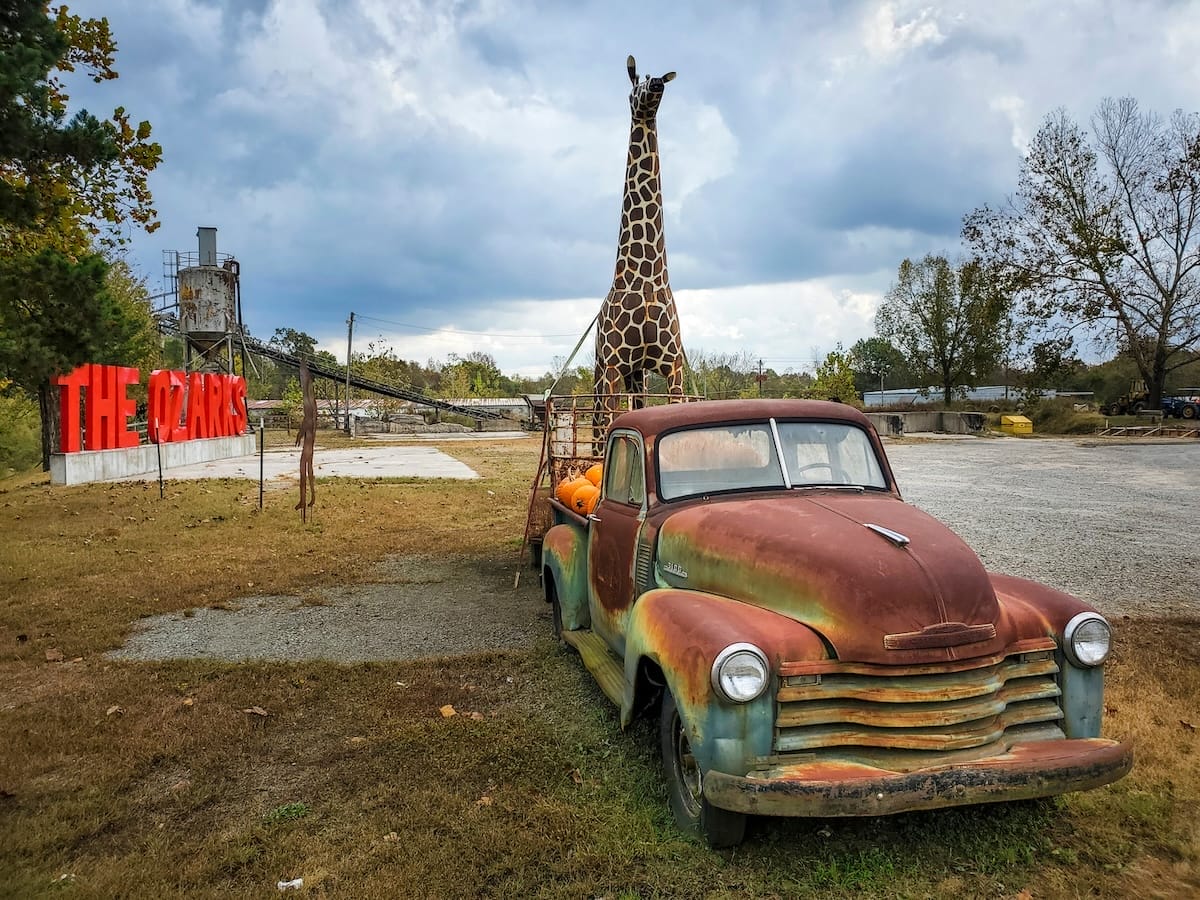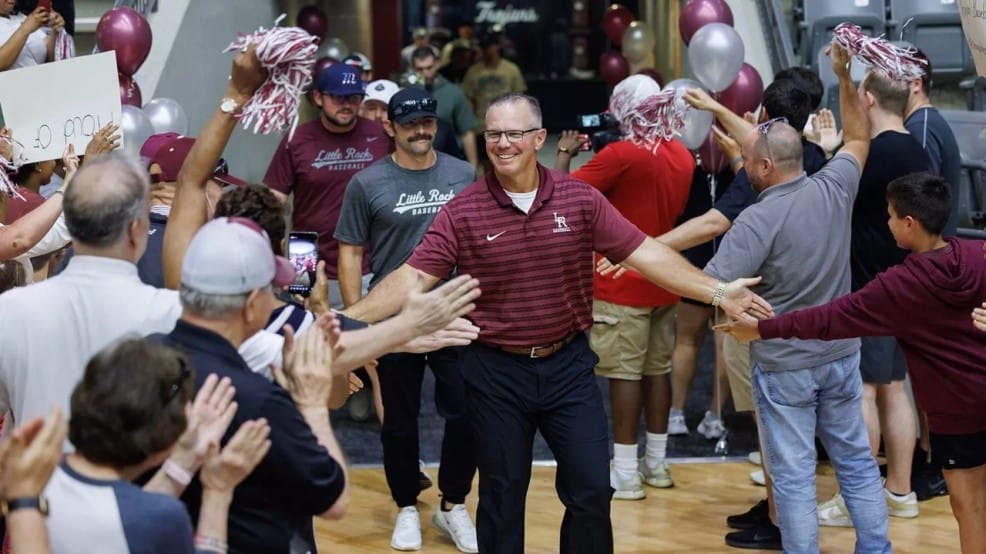

Uh oh...
It appears that you're using a severely outdated version of Safari on Windows. Many features won't work correctly, and functionality can't be guaranteed. Please try viewing this website in Edge, Mozilla, Chrome, or another modern browser. Sorry for any inconvenience this may have caused!
Read More about this safari issue.

The widely accepted short version of our Arkansas Razorback story goes like this. On November 13, 1909, the football coach of the University of Arkansas Cardinals stepped off the train after an unexpected victory over LSU and changed the image of Arkansas sports forever.
Sometimes I feel as if I was too much of an animal to be much good to myself or to others. My vitality is sometimes terrible to me. I crave action, pulling, mauling, hauling. I could have acted as a mule in a call boat or heave a rock but that would satisfy only the physical craving and not the desire for mental enjoyment.” –Hugo Bezdek
Although the Northern-educated Bohemian immigrant had little in common with his constituents, he was already a hero in the Ozarks. He had brought pride and an unrelenting fighting spirit to the university. Consumed by the thrill of victory, Coach Hugo Bezdek exclaimed that his team had played like “a wild band of razorback hogs.” His experience with wild razorback hogs was obviously questionable.
Hugo Francis Bezdek immigrated from Bohemia (Czech Republic) with his parents when he was about five years old. The Bezdeks settled in the Chicago area, where young Hugo immediately developed a love for American sports. He excelled at football, baseball, and boxing as a teen and later became a two-sport star at the University of Chicago under legendary coach Amos Alonzo Stagg.
Hugo Bezdek at the University of Chicago
After graduation from Chicago, Bezdek had a frustrating year coaching at The University of Oregon. Publicly he stated that after a year of coaching, he was returning to the University of Chicago to become a doctor. If he ever seriously studied medicine, by the spring of 1908, he had reexamined his career choice and accepted a coaching position at the University of Arkansas. In his new position, he would mix his unrelenting quest for success with improved people skills, a detail of college coaching he had neglected in his first job.
I dare say it is in self-defense that I stick to athletics and keep away from the chemist’s retort and the physician’s chair,” –Hugo Bezdek
Two years earlier, at the University of Oregon, the intense young coach had won victories on the playing field but lost favor with his players and bickered with his administration. At Arkansas, Bezdek was determined to temper his competitive nature and become a better communicator. In his five years at Fayetteville, he would become a beloved mentor, inspirational motivator, and the legendary father of Razorbacks sports.
In 1908 at the University of Arkansas, Bezdek was “the coach,” which meant he coached the football team in the fall and the baseball team in the spring. Although his most impressive credentials were as a football player, to categorize Bezdek as a football coach forced to coach baseball would be inaccurate. In a coaching career that spanned 40 years, he enjoyed extraordinary success at the highest level in both sports.
Bezdek’s first football team went 5–4 in the fall of 1908. The rejuvenated young team won all its home games but lost every road contest and a Little Rock game to LSU. The undermanned squad was outscored 9–108 in games away from Fayetteville. There was work to be done, but the young coach’s revised new temperament had won the hearts of his athletes and the enthusiastic support of his fans.
In the spring, when Bezdek called for those men interested in baseball to attend a pre-practice meeting, 70 prospects reported. Bezdek’s first baseball team at the U of A would not only have a nucleus of quality players but an astute coach who had won the confidence of his players. In a state that loved baseball, success came immediately.
Bezdek’s first Arkansas baseball team opened with a two-game sweep of Cumberland College (University of the Ozarks) in early April. The makeup of the opposing teams was an indication of the quality of baseball talent available in Arkansas. Between the two squads, 11 future professional baseball players participated in the series. Charles Tompkins, a lawyer’s son from Prescott, pitched a 6–0 win in game one, and John Vann, a descendant of the legendary Chief Vann of the Cherokee Nation, tossed an 8–0 shutout for the Cardinals in the second game. Both Arkansas pitchers would later reach the major leagues.
The 1909 baseball team finished the season 12–4. The record does not include a win, a loss, and a tie in a series in mid-April with the minor league Springfield Midgets. An exhibition game with a professional team would be a feature of Bezdek’s creative scheduling.
The fall of 1909 is a benchmark season in the University of Arkansas’ athletic history. The football team went from an easy opponent to a feared rival in one short year. A 7–0 record included wins over Oklahoma and LSU, teams that had dominated the Cardinals the previous year. The school newspaper described the atmosphere as the Arkansas faithful waited for the arrival of the conquering heroes on November 13.
As the time approached for the final report, the throng began to crowd around the telegraph office again. Its words were few, but they meant much to anxious students. “Brilliant game, Arkansas 15, Louisiana 0.” In one game Arkansas had placed herself in the front rank on the Southern gridiron…The team arrived home Tuesday morning and no team was ever given a more royal welcome than was Bezdek’s warriors on their return from Memphis.”
Hugo Bezdek would remain at Arkansas for five years. Although he was successful in both sports, by the 1912-1913 school year, he was showing signs that he needed a change. The University was not moving fast enough to create new athletic facilities, and Bezdek was getting restless. The 1913 baseball season would be Hugo Bezdek’s last season with the Razorbacks.
Bezdek explained his choice was based more on ambition than salary: “It is not money that I am after; it is the opportunity to develop myself and become an authority in my line of work.” Although U of A officials publicly vowed to make improvements to keep their highly regarded coach, Bezdek would not change his mind.
After leaving Arkansas, Bezdek’s goal to be an “authority” in his field was evident in the variety of his accomplishments. He won a Rose Bowl as the football coach at Penn State, coached a pro football team, and managed a major league baseball team. Bezdek was inducted into the College Football Hall of Fame in 1954.
Bezdek’s Arkansas football teams had a combined record of 29–13–1, an excellent .686 winning percentage. His five baseball teams produced a record of 53 wins, 32 losses, and one tie. Coach Bezdek’s .715 is the highest all-time winning percentage among Razorback baseball coaches. His record is exemplary, but perhaps Hugo Bezdek is best known in Arkansas as the originator of the Razorback mascot.

Although the Cardinals had been called Razorbacks for several years, 1909 was the first time a person of Coach Bezdek’s stature endorsed the idea of a fighting Ozark Mountain hog as beautifully fierce and unyielding. The students loved the idea, and by the end of the school year, the U of A mascot became the beloved Razorback. A historical marker on Dickson Street marks the spot where the momentous event occurred.
In 1961, almost 50 years after he last coached at the University of Arkansas, Hugo Bezdek, the father of the Razorbacks, was inducted into the Arkansas Sports Hall of Fame.
Join the Conversation
Leave a Comment
One response to “The Legend of Hugo Bezdek | The Father of the “Razorbacks””
 Leave a Reply
Leave a Reply
We do the work.
You check your email.
Sign up for our weekly e-news.
Get stories sent straight to your inbox!













 Leave a Reply
Leave a Reply
[…] a spirited college town, transforms on game weekends with the infectious energy of Arkansas Razorback supporters. A hearty bacon breakfast seems like the perfect fuel for fans. Whether you’re visiting a college […]